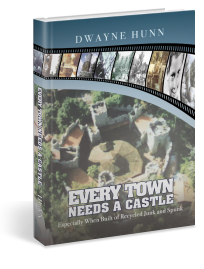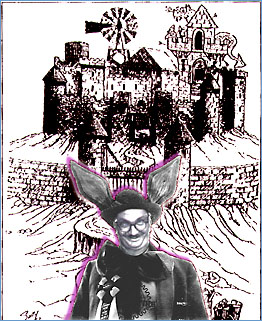 Every Town Needs A Castle - by Dwayne Hunn
Every Town Needs A Castle - by Dwayne Hunn
If, like the author you've lived in Cleveland, Chicago, New York, Mumbai, Claremont, St. John, Sacremento, or San Francisco, you've seen Knight Nader attack political fortresses. So, If Ralph places your first book, Ordinary People Doing the Extraordinary, on his 2009 Top Ten Books to Read List, why write your second on Prince Philip's favorite junkyard, California's Rubelian Castle, forged from junk piled 76 feet high by a band of phunny pharmers for no monetary gain in the midst of exclusive suburbia.
Every Town Needs A Castle, Especially if Made of Recycled Junk and Spunk, is filled with pictures and art (80+) depicting zany building baffles, amazes, and inspires; old-timers' homespun wisdoms needed again today; and hands-on adventure takes that are weakly replaced today with IPOD'd ventures.
This is a book for kids, because Rubelia's King was a kid who never grew up; for builders, especially those who build differently; for story lovers, for it presents several wonderful story tellers; for quixotic dreamers, because this Don and his Sanchos tilt with everything while building windmills and crazy stuff; for budding leaders, travelers, and doers, because it reveals how the benevolent Rubelian Ruler developed his unique public policy perspectives.
Order this book directly from the author.
 One
Man's Dream - The Spirit of Rubel Castle
One
Man's Dream - The Spirit of Rubel Castle
You can
get an autographed copy instead, sent without shipping charges from the
author himself.
Dave
Traversi dct@svn.net, (707) 762-3866.
Also at some Barnes and Nobles and at the Village Book Shop in Glendora.
Dec. 3-9, 2003
There is a magical castle built in the midst of an exclusive residential section of Glendora, California.
It was created by a man who had the same dream as William Randolph Hearst, but lacked the resources to accomplish it.
It is even more unusual because it was built almost entirely from left-overs; things like abandoned railroad tracks, timbers used in the construction of freeways, hundreds of thousands of tons of alluvial rocks from the San Gabriel Mountains and an endless supply of abandoned steel, cable, and bottles.
This was the work of Michael Rubel and his band of volunteers called The Pharm Hands.
It was arguably the first major recycling project in the United States and was the materialization of his lifelong dream.
Michael Rubel is not a conformist; in fact, he might be labeled a throwback.
The Castle was his primary life's work, requiring twenty-eight years for its completion.
Michael came by his heritage of non-conformity from his parents, having a mother who performed for five years on Broadway in the Ziegfeld Follies, as well as on her own with such famous stars as Fanny Brice, W.C. Fields, and Jack benny. His father was a Episcopalian Minister as well as a gag writer and performing partner for the famous radio comedian, Joe Penner. Throw in a grandfather who was a classmate of Herbert Hoover, and taught Michael a philosphy of life which he summed up as, "Blessed be our imagination - it makes life a toy."
The construction started with a two-million gallon concrete reservoir and now boasts towers which stand seventy-five feet tall, battlements with cannons (real cannons) for protection, blacksmith shop, weaving and stained glass shops, and medievel living accommodations for Michael and his wife.
The entire Castle is built of river rock and concrete. For the most part, it was all done without money, relying on volunteer help and donated or liberated materials.
It is beyond anything the imagination can conceive and it attracts thousands of visitors a year, all of whom would welcome a written history of the spectacle they have witnessed.
The story of its construction is compelling. It was accomplished entirely without plans or building permits of any kind, with constant harassment from city officials who wanted Michael ousted from the two and one-half acre compound. They even took him to court where he was jailed and threatened for failure to cease construction. But even more fascinating is the humor which permeated this project, for Michael, the Pharm Hands and Grandfather were masters of the art of hoaxing and practical joking. The victims of these ongoing humorous pranks was almost always the officialdom threatening them.
But the project had the support of most of the city's residents who loved the Rubel family, and therein lies the source of Michael's power of oppositional politics. The story is magical because of the willingness of the Pharm Hands to not only believe in Michael's dream of building a castle, but to join in the pursuit of the dream with a determination which would not be discouraged, all despite the fact that they could not really visualize what it was they were doing.
This is the truly captivating element of Rubelia, the name commonly used to describe the Castle, and its history: the special quality Michael possesses inspiring everyone to join in his dream.
The tale is inspirational; telling the story of a man who went his own way in life, who refused to accept that he must conform to society's norms.
For more informational pages about the castle, see The Shriek.
Huell Howser also covered the castle about ten years ago. It is one of the favorite Huell videos.
